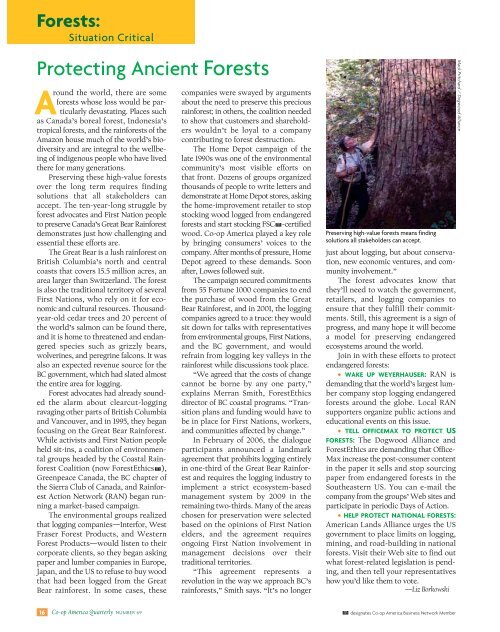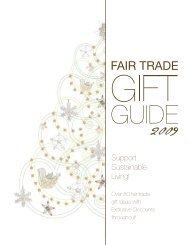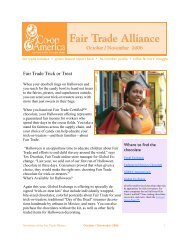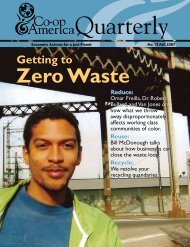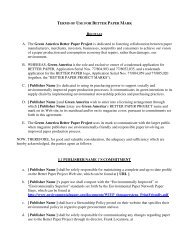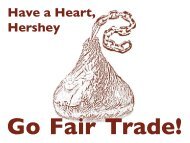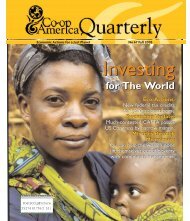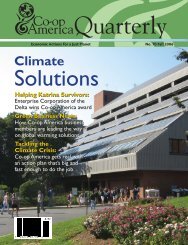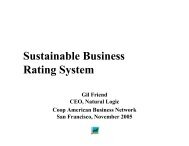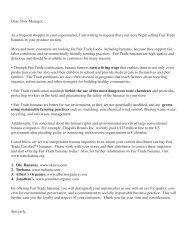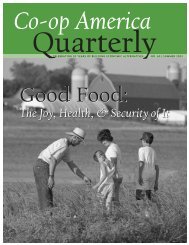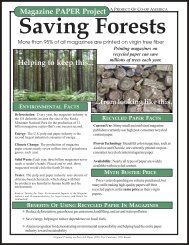Forests: Forests: - Green America
Forests: Forests: - Green America
Forests: Forests: - Green America
Create successful ePaper yourself
Turn your PDF publications into a flip-book with our unique Google optimized e-Paper software.
<strong>Forests</strong>:<br />
Situation Critical<br />
Protecting Ancient <strong>Forests</strong><br />
A<br />
round the world, there are some<br />
forests whose loss would be particularly<br />
devastating. Places such<br />
as Canada’s boreal forest, Indonesia’s<br />
tropical forests, and the rainforests of the<br />
Amazon house much of the world’s biodiversity<br />
and are integral to the wellbeing<br />
of indigenous people who have lived<br />
there for many generations.<br />
Preserving these high-value forests<br />
over the long term requires finding<br />
solutions that all stakeholders can<br />
accept. The ten-year-long struggle by<br />
forest advocates and First Nation people<br />
to preserve Canada’s Great Bear Rainforest<br />
demonstrates just how challenging and<br />
essential these efforts are.<br />
The Great Bear is a lush rainforest on<br />
British Columbia’s north and central<br />
coasts that covers 15.5 million acres, an<br />
area larger than Switzerland. The forest<br />
is also the traditional territory of several<br />
First Nations, who rely on it for economic<br />
and cultural resources. Thousandyear-old<br />
cedar trees and 20 percent of<br />
the world’s salmon can be found there,<br />
and it is home to threatened and endangered<br />
species such as grizzly bears,<br />
wolverines, and peregrine falcons. It was<br />
also an expected revenue source for the<br />
BC government, which had slated almost<br />
the entire area for logging.<br />
Forest advocates had already sounded<br />
the alarm about clearcut-logging<br />
ravaging other parts of British Columbia<br />
and Vancouver, and in 1995, they began<br />
focusing on the Great Bear Rainforest.<br />
While activists and First Nation people<br />
held sit-ins, a coalition of environmental<br />
groups headed by the Coastal Rainforest<br />
Coalition (now ForestEthics m ),<br />
<strong>Green</strong>peace Canada, the BC chapter of<br />
the Sierra Club of Canada, and Rainforest<br />
Action Network (RAN) began running<br />
a market-based campaign.<br />
The environmental groups realized<br />
that logging companies—Interfor, West<br />
Fraser Forest Products, and Western<br />
Forest Products—would listen to their<br />
corporate clients, so they began asking<br />
paper and lumber companies in Europe,<br />
Japan, and the US to refuse to buy wood<br />
that had been logged from the Great<br />
Bear rainforest. In some cases, these<br />
companies were swayed by arguments<br />
about the need to preserve this precious<br />
rainforest; in others, the coalition needed<br />
to show that customers and shareholders<br />
wouldn’t be loyal to a company<br />
contributing to forest destruction.<br />
The Home Depot campaign of the<br />
late 1990s was one of the environmental<br />
community’s most visible efforts on<br />
that front. Dozens of groups organized<br />
thousands of people to write letters and<br />
demonstrate at Home Depot stores, asking<br />
the home-improvement retailer to stop<br />
stocking wood logged from endangered<br />
forests and start stocking FSC m -certified<br />
wood. Co-op <strong>America</strong> played a key role<br />
by bringing consumers’ voices to the<br />
company. After months of pressure, Home<br />
Depot agreed to these demands. Soon<br />
after, Lowes followed suit.<br />
The campaign secured commitments<br />
from 55 Fortune 1000 companies to end<br />
the purchase of wood from the Great<br />
Bear Rainforest, and in 2001, the logging<br />
companies agreed to a truce: they would<br />
sit down for talks with representatives<br />
from environmental groups, First Nations,<br />
and the BC government, and would<br />
refrain from logging key valleys in the<br />
rainforest while discussions took place.<br />
“We agreed that the costs of change<br />
cannot be borne by any one party,”<br />
explains Merran Smith, ForestEthics<br />
director of BC coastal programs. “Transition<br />
plans and funding would have to<br />
be in place for First Nations, workers,<br />
and communities affected by change.”<br />
In February of 2006, the dialogue<br />
participants announced a landmark<br />
agreement that prohibits logging entirely<br />
in one-third of the Great Bear Rainforest<br />
and requires the logging industry to<br />
implement a strict ecosystem-based<br />
management system by 2009 in the<br />
remaining two-thirds. Many of the areas<br />
chosen for preservation were selected<br />
based on the opinions of First Nation<br />
elders, and the agreement requires<br />
ongoing First Nation involvement in<br />
management decisions over their<br />
traditional territories.<br />
“This agreement represents a<br />
revolution in the way we approach BC’s<br />
rainforests,” Smith says. “It’s no longer<br />
Preserving high-value forests means finding<br />
solutions all stakeholders can accept.<br />
just about logging, but about conservation,<br />
new economic ventures, and community<br />
involvement.”<br />
The forest advocates know that<br />
they’ll need to watch the government,<br />
retailers, and logging companies to<br />
ensure that they fulfill their commitments.<br />
Still, this agreement is a sign of<br />
progress, and many hope it will become<br />
a model for preserving endangered<br />
ecosystems around the world.<br />
Join in with these efforts to protect<br />
endangered forests:<br />
• WAKE UP WEYERHAUSER: RAN is<br />
demanding that the world’s largest lumber<br />
company stop logging endangered<br />
forests around the globe. Local RAN<br />
supporters organize public actions and<br />
educational events on this issue.<br />
• TELL OFFICEMAX TO PROTECT US<br />
FORESTS: The Dogwood Alliance and<br />
ForestEthics are demanding that Office-<br />
Max increase the post-consumer content<br />
in the paper it sells and stop sourcing<br />
paper from endangered forests in the<br />
Southeastern US. You can e-mail the<br />
company from the groups’ Web sites and<br />
participate in periodic Days of Action.<br />
• HELP PROTECT NATIONAL FORESTS:<br />
<strong>America</strong>n Lands Alliance urges the US<br />
government to place limits on logging,<br />
mining, and road-building in national<br />
forests. Visit their Web site to find out<br />
what forest-related legislation is pending,<br />
and then tell your representatives<br />
how you’d like them to vote.<br />
—Liz Borkowski<br />
Mack Pritchard / Dogwood Alliance<br />
16<br />
Co-op <strong>America</strong> Quarterly NUMBER 69<br />
m designates Co-op <strong>America</strong> Business Network Member


